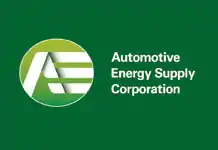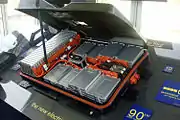Automotive Energy Supply Corporation
Automotive Energy Supply Corporation (AESC) is a manufacturer of lithium ion batteries for electric vehicles established 2007 as a joint venture between Nissan, NEC and Tokin Corporation.
 | |
| Industry | Electric vehicle battery |
|---|---|
| Founded | 2007 |
| Website | www.eco-aesc-lb.com |
History
In 2007 NEC Corporation, Nissan Motor Company, and NEC Tokin agreed to establish a lithium-ion battery company focused on development to production of batteries for electric vehicles;[1] in 2008 the company was established with a capital of ¥1.5 billion ($14.3million) with a 51:42:7 Nissan:NEC:NEC TOKIN shareholding; the business was to establish a manufacturing site at Nissan's facility in Zama, Kanagawa c.2009, with an initial capacity of 13,000 units per year, rising to 65,000 units per year on an investment of ¥12 billion ($114.6 million). The plant was to be supplied with lithium manganese electrode from NEC TOKIN's factory in Sagamihara, Kanagawa; itself upgraded at a cost of ¥11 billion ($128million). Initial markets were to be forklift trucks, followed by electric and hybrid vehicles manufactured by Nissan.[2][3]
Initial production of the Lithium Manganese Oxide battery (LiMn 2O4) LMO was based on a manganese spinel cathode, with batteries formed from laminated cells. The battery (L3-10) was a 251 by 144.2 by 9.2 millimetres (9.88 in × 5.68 in × 0.36 in) unit of 13Ah, 3.6V with a power density of 2060W/kg (2.5V @ 20 °C).[4]
In late 2008 the joint owners announced they were investing a further ¥100 billion ($1.1 billion) in AESC, establishing an additional factory to increase capacity for around 200,000 vehicles per year.[5] Trial production at Zama began mid 2009.[6]
In 2010 the Nissan Leaf electric vehicle began production, using batteries from AESC.[7]
In 2014 AESC was the second largest electric vehicle battery manufacturer worldwide (after Panasonic), with 21% of the market.[8] In late 2014 Reuters reported conflict within the Nissan / Renault carmaker alliance over sourcing of battery packs for its Nissan Motor Manufacturing UK and Nissan Smyrna assembly plant (USA) car battery plants due to lack of price competitiveness with rival cell manufacturer LG Chem - Nissan was reported to have signed contracts to take all of NEC's electrode production, irrespective of sales.[9]
In 2016, Nissan decided to sell its 51% stake in AESC, preferring external suppliers.[10] In December, 2016 Carlos Ghosn explains that being tied to internal battery manufacturing does not allow for the flexibility of buying cheaper third party batteries.[11]
In mid 2017 Nissan announced it was to sell its battery businesses including AESC (including acquiring the 49% NEC stake) to Chinese investment company GSR Capital for ~$1 billion.[12] However, this sale did not actually happen and after three delays was canceled in July 2018 as intended buyer GSR Capital did not complete funding for the sale.[13]
In Aug 2018, Nissan announced it would sell its electric car battery unit to Chinese renewable group Envision Group, while retaining a 25% stake. The sale included AESC as well as battery manufacturing plants in USA (Tennessee) and England (Sunderland). NEC's 49% stake was also to be sold to Envision.[14][15]
In April 2019 the company, announced plans to open a new 20GWh capacity battery plant in Wuxi, Jiangsu, China, roughly triple its production capacity of 7.5GWh/pa.[16]
Gallery
_in_Tokyo_Motor_Show_2009.jpg.webp) Individual cell (left) and packaged battery or "module" (right), Tokyo Motor Show (2009)
Individual cell (left) and packaged battery or "module" (right), Tokyo Motor Show (2009) Battery pack (2011)
Battery pack (2011)
References
- NISSAN AND NEC TO FORM NEW COMPANY FOR ADVANCED BATTERIES (press release), Nissan, 13 Apr 2007, archived from the original on 20 December 2016, retrieved 14 February 2016
- NISSAN AND NEC JOINT VENTURE - AESC - STARTS OPERATIONS (press release), Nissan, 19 May 2008, archived from the original on 8 April 2016, retrieved 14 February 2016
- Toudou, Yasuto (20 May 2008), NEC Group, Nissan Announce Li-ion Battery Production Plan, Nikkei Technology
- "AESC: Lithium-ion Batteries for Nissan-Renault's Hybrids, PHEVs and EVs", www.greencarcongress.com, 16 May 2008
- "Report: Nissan, NEC to Invest $1.1B or More to Increase Li-ion Supply for EVs and HEVs", www.greencarcongress.com, 28 Dec 2008
- AUTOMOTIVE ENERGY SUPPLY CORPORATION BEGINS TRIAL PRODUCTION OF LITHIUM-ION BATTERIES (press release), Nissan, 16 July 2009, archived from the original on 20 December 2016, retrieved 14 February 2016
- Production of 100% Electric, Zero-Emission Nissan LEAF begins at Oppama, Japan (press release), Nissan, 22 Oct 2010, archived from the original on 2011-01-01, retrieved 2016-02-14
- Deign, Jason (10 Apr 2015), "Who Is the World's Biggest Electric Vehicle Battery Supplier?", www.greentechmedia.com
- Frost, Laurence (12 Sep 2014), "Exclusive: Nissan faces battery plant cuts as electric car hopes fade", www.reuters.com
- "Nissan's battery pullout may energize rivals", Nikkei, 6 August 2016, archived from the original on 6 August 2016
- https://www.forbes.com/sites/bertelschmitt/2016/12/16/carlos-ghosn-explains-why-making-your-own-batteries-is-dumb
- Wu, Kane; Gallagher, Chris (8 Aug 2017), "Nissan to sell its electric battery business to GSR Capital", www.reuters.com
- Tajitsu, Naomi; Wilson, Thomas (2 July 2018), "Nissan calls off potential $1 billion sale of battery unit to China's GSR", www.reuters.com
- "Nissan agrees to sell car battery unit to China's Envision Group", www.reuters.com, 3 Aug 2018
- "Nissan To Sell Battery Division To Envision Group", insideevs.com, retrieved 2018-10-10
- "Nissan Leaf's Battery Supplier Builds First China Factory", Bloomberg News, 15 April 2019
